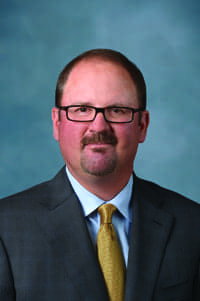
BY: KURT WOOCK
As the divisional VP, diagnostics, US commercial operations, at Abbott, Abbott Park, Ill, Greg Ahlberg views diagnostics from a lofty vantage point. Charged with understanding what challenges and opportunities labs will have in the future and what strategies and technologies they can use to meet them, his insight is invaluable for those who are working through how to best prepare today’s labs for the challenges of tomorrow. CLP sat down with Ahlberg to discuss these matters.
CLP: The oft-cited statistic that shows labs supply 80% of diagnostic information but comprise only 2% of the budget has, for a while, been the go-to phrase used to describe the outsized value labs provide. Do you believe that’s still the best way to summarize the value proposition of clinical labs?
Greg Ahlberg: Generally, yes—I believe that is still the best way to summarize the value of clinical, but it’s also important for diagnostics to get more specific by showing the value that diagnostic medicine provides in terms of the quality outcome or the cost-efficiency of the delivery of care.
For example, Abbott participated in a study that showed when we help healthcare providers detect HIV-positive patients in the acute stage, the healthcare system saves up to $500,000 in downstream costs. It’s great that we generally send 80% of the information in medicine, but we need to back that up with examples.
CLP: The Affordable Care Act (ACA) presents new challenges and new opportunities. Which of these opportunities do you see as being the most consequential for labs in the near future?
Ahlberg: I believe it comes right down to these quality metrics found in the ACA. When you start digging into them, most of these quality metrics are tied to the lab. Another part of the emphasis will be on more precise diagnostics.
CLP: So more and more emphasis will be placed on achieving an earlier diagnosis?
Ahlberg: Yes, but another part will be more precise diagnoses. I believe it’s a mix of efficiency that you create and the ability to deliver quality results.
CLP: How big an issue is overtesting?
Ahlberg: We can’t be running unnecessary tests, but we also can’t be consumed with reducing testing. We need a balance: A wrong diagnosis or a late diagnosis can have major consequences.
CLP: What do you see as a logical path for labs to take to become more efficient and quality-driven?
Ahlberg: I’ve started to see labs adopt the consolidation of testing approach as they trim out the inefficiencies of the lab, whether they achieve this through automation, using a hub-and-spoke model, etc. Those are the first actions that health systems are taking to drive operating costs down.
When they move past those actions, then it’s into the space of test rationalization, which includes sending guidelines to physicians, checking test ordering, and instituting rules for ordering certain tests.
CLP: How will the move away from fee-for-service models affect laboratories?
Ahlberg: I believe it’s going to tie labs more directly to quality of care across the continuum of care. It all goes back to those quality care metrics. The lab’s role is going to become more evident in the long term.
However, in the interim, there’s a bull’s-eye on clinical lab reimbursement fees.
There’s kind of a paradox—the first thing is, “Let’s cut reimbursement of clinical lab testing,” and yet the underlying movement of ACA is using these quality metrics driving quality care, something that actually emphasizes the role of clinical laboratories.
CLP: Are the forthcoming changes going to be felt equally by labs of different types and sizes?
Ahlberg: I believe the challenges are felt fairly similarly across the board. You’ve seen health systems seek shelter in scale—they are merging, forming partnerships—and they’re doing these things because they don’t really know what’s going to come from the ACA. They are all dealing with the same fundamental issue. Larger systems are going to have more leverage, but when we walk into a smaller health system, we don’t feel anything fundamentally different.
CLP: What’s the biggest challenge facing labs today?
Ahlberg: I don’t know that we know that yet. We are just barely dabbling in the value-based purchasing side of things. The biggest challenge remains in what has yet to be provided by Medicare, health insurance, ACOs [accountable care organizations]. There are a lot of unknowns. The market will figure that out. The focus is how do you work more effectively and efficiently, and I don’t believe that’s going to change.
Kurt Woock is the associate editor for CLP.
| RELATED READING: Inside Track interview with Sten Westgard, director of client services and technology for Westgard QC, titled “Sigma-Metric Approach to QC.” |



